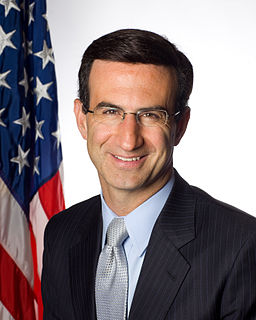A Quote by Peter Orszag
It is a foregone opportunity that we could have a trillion dollars more of income for the United States if we were producing at capacity rather than falling so far short of it.
Related Quotes
The potential of Mexico, Canada and the United States is enormous. We have a combined population of half a billion people; peaceful trade-friendly borders that are the envy of the world; the prospect of energy independence is within reach and will change the geopolitical situation of United States; we do a trillion dollars in trade among the three countries; more than 18,000 American companies are involved in foreign direct investment in Mexico and Canada; an increasing number of Mexican companies are creating jobs in the United States.
It is my view that what is important is cutting government spending, however spending is financed. A so-called deficit is a disguised and hidden form of taxation. The real burden on the public is what government spends (and mandates others to spend). As I have said repeatedly, I would rather have government spend one trillion dollars with a deficit of a half a trillion than have government spend two trillion dollars with no deficit.
We've incentivized people in the past to maybe turn their vehicles over, you know sooner rather than later. And in the United States with the squeeze on discretionary income and credit that even as the economy comes back there's probably more of a chance than not that it'll be a slower recovery on auto sales.
In my opinion, we've spent $4 trillion trying to topple various people [on the Middle East] that frankly, if they were there and if we could've spent that $4 trillion in the United States to fix our roads, our bridges, and all of the other problems; our airports and all of the other problems we've had, we would've been a lot better off.
By using general consumption PPPs, the World Bank is, in effect, saying to the poor: "Sure, you cannot buy as much food as the dollar value we attribute to your income would buy in the United States. But then you can buy much more by way of services than you could buy with this PPP equivalent in the United States." But what consolation is this? The poor do not buy services - they are services, on their luckier days.
The Savior desires to save us from our inadequacies as well as our sins. Inadequacy is not the same as being sinful - we have far more control over the choice to sin than we may have over our innate capacity. . . . A sense of falling short or falling down is not only natural but essential to the mortal experience. Still, after all we can do, the Atonement can fill that which is empty, straighten our bent parts, and make strong that which is weak.



































